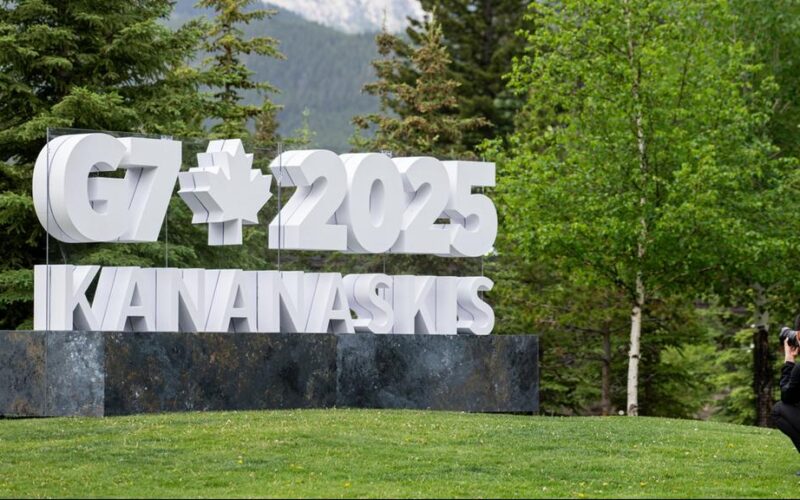Kananaskis, Alberta (Rajeev Sharma): World leaders are converging in the Canadian Rockies for a high-stakes G7 Summit, set against the backdrop of escalating global conflicts and rising economic tensions, particularly with the United States.
The summit, taking place from June 15 to 17 in Kananaskis Country, Alberta, is being hosted by Canadian Prime Minister Mark Carney. Leaders from the world’s largest economies are expected to focus on a growing war in West Asia, ongoing instability in Ukraine, and US President Donald Trump’s looming threats of tariffs on allies.
The geopolitical climate took a sharp turn with Israel’s recent strikes on Iran, prompting a retaliatory response from Tehran. The sudden escalation has caught several governments off guard, adding urgency to the summit’s agenda.
British Prime Minister Keir Starmer, speaking en route to Canada, confirmed he had held discussions with both President Trump and Israeli Prime Minister Benjamin Netanyahu in an effort to calm rising tensions. Britain has responded by deploying Royal Air Force jets and additional forces to the region.
“We recognise Israel’s right to self-defence, but this situation must de-escalate immediately,” Starmer said. “There’s a huge risk of regional spillover and broader global instability.”
In a break from tradition, Prime Minister Carney has opted not to issue a formal communique at the summit’s conclusion, a move seen as a recognition of deep divisions among leaders, especially around Trump’s disruptive diplomacy.
President Trump remains the wild card of the gathering. His controversial comments, including a threat to make Canada the 51st US state and revive his interest in purchasing Greenland, have overshadowed pre-summit conversations. In a symbolic rebuke, French President Emmanuel Macron made a pre-summit stop in Greenland, meeting its leadership and Denmark’s prime minister aboard a Danish military vessel.
Macron, who has maintained a cautious relationship with Trump since the latter’s first term, continues to push for unity in Europe and security guarantees for Ukraine. However, his efforts, alongside Starmer’s, to forge a post-ceasefire coalition in Ukraine have yet to receive American backing.
Trump is expected to arrive in Kananaskis late Sunday. While official proceedings begin Monday, informal bilateral meetings are already being scheduled, reflecting Trump’s preference for one-on-one talks rather than multilateral engagement.
“Trump doesn’t enjoy the roundtable format,” said Peter Boehm, a veteran of several G7 summits. “He prefers private conversations where he feels in control, and sometimes uses that setting to pressure or intimidate.”
Among the invited non-G7 nations are India, Ukraine, Brazil, South Africa, South Korea, Australia, Mexico, and the UAE, with trade relations and economic cooperation expected to feature prominently in side discussions.
Meanwhile, Trump’s aggressive trade stance continues to rattle allies. Although the UK and US recently announced a deal to reduce tariffs on British-made cars, steel, and aluminium, the agreement hasn’t taken effect, and there is concern Tthat rump could reverse course.
British officials, however, remain optimistic. “We trust in the strength of our trade ties,” Starmer remarked.
Still, the British prime minister has drawn criticism at home and abroad for not addressing Trump’s provocative comments about Canada. When asked about Trump’s remarks on turning Canada into the 51st state, Starmer diplomatically sidestepped. “Canada is a sovereign, independent nation and a much-valued Commonwealth partner,” he said.
Canadian officials and observers remain cautious. Former Prime Minister Jean Chrétien, speaking at a recent panel, advised calm. “If Trump acts out, let him. Don’t engage. Keep things moving,” he said. “He craves attention.”
Ukrainian President Volodymyr Zelenskyy is also attending the summit, with a much-anticipated meeting scheduled with Trump. Their last encounter ended on a tense note, exposing the fragility of Kyiv-Washington relations under Trump’s leadership.
As global eyes turn to Kananaskis, the question remains: can the G7 rise above discord and deliver coordinated responses to some of the world’s most pressing crises, or will the summit be remembered for division and diplomatic strain?

